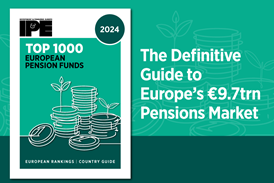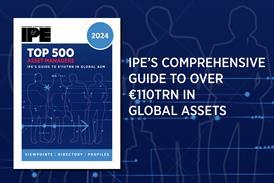ETFs – Page 3
-
 Special Report
Special ReportGlobal emerging markets index investing: the case for an active component
Emerging market (EM) equities have an important role to play in broadly diversified institutional portfolios. Our data analysis shows that for investors who have a buy-and-hold strategy, an active component is needed to stay close to the benchmark because of trading costs and, more importantly, because of higher slippage costs by passive managers in downward markets.
-
 Special Report
Special ReportActive ETFs: mixed fortunes
Tax efficiency and regulatory change have been the key drivers of the development of active exchange-traded funds in the US. As there are no similar tax benefits nor regulatory change in Europe, growth in this region has been limited.
-
 Special Report
Special ReportIPE ETF Investor Survey 2022
IPE’s first survey of investors focusing specifically on ETFs, conducted between mid-July and mid-August 2022, drew responses from institutional investors across nine European jurisdictions, of which 24% were invested in ETFs. Respondents were located in Belgium, Denmark, Germany, Italy the Netherlands, Portugal, Spain, Sweden and the UK.
-
 Special Report
Special ReportETFs Guide 2022: Better tax treatment could prompt European ETF takeoff
First the good news: Globally, investment in ETFs continues to surge, with the first half of 2022 seeing the second highest inflows on record. The flexibility and ease of access they offer helped them play an instrumental role achieving the highest volume fixed income trading day being recorded in June, as $58bn of assets were moved from EM debt and high yield into government bonds (see p7). This helped cement ETFs’ position as an essential tool of the fixed income ecosystem.
-
News
New thematic ETFs seen increasingly as active investment vehicles
Investors also keen to see more focus on social issues, according to poll
-
News
Thermal coal mining bond in ESG ETF but now sold, data coverage rectified
Bond was issued by SPV that was initially not linked to the parent, Siberian Coal Energy JSC
-
News
BlackRock: Institutions to help drive global bond ETFs to $5trn by 2030
Asset manager upgrades forecast ‘despite the most challenging fixed income market in decades’
-
News
Varma gains €300m exposure to low-emission Japanese stocks via tailored ETF
Finnish pensions firm seeds Nomura-run exchange-traded fund amid low availability of ESG ETFs in Japan
-
News
Amundi sets out post-Lyxor acquisition AUM aims
Lyxor is now a subsidiary of Amundi and in a second phase will be merged into Amundi
-
 Special Report
Special ReportMulti-purpose, measuring up and poised for the European mainstream
As the world economy emerges from COVID-19, the relentless rise of ETFs continues. Assets invested in ETFs and ETPs listed globally reached a record $9.35trn (€7.94trn) at the end of June 2021, with year-to-date net inflows at a record $660.7bn, according to research firm and consultancy ETFGI.
-
 Special Report
Special ReportGreen ETFs: a perfect pairing or fleeting fad?
Sustainable investing is here to stay. What was once a set of niche strategies for environmentally conscious investors is now an industry expected to hold a third of global assets by 2025, according to Bloomberg analysis.
-
Special Report
Sustainable ETFs are a pension scheme’s friend
Pension fund trustees already face myriad challenges and, today, most schemes face a timeline for compliance with various climate and ESG regulations, which vary by country, scheme type and scheme size. Meanwhile, the intensifying spotlight being shone by scheme members on areas like climate, diversity and stewardship will continue to pave the direction of travel.
-
 Special Report
Special ReportInvestor self-seeded ETFs: the dos and don’ts
Two of Finland’s biggest pension firms – Varma and Ilmarinen – have initiated the launch of several ESG-themed ETFs over the past few years. In April this year, Ilmarinen announced it was investing €170m in the new AXA WF US high yield low carbon bonds fund, which focuses particularly on the carbon and water intensity scores of issuers, acting as a seed investor for the fund launch.
-
 Special Report
Special ReportESG and fixed income: a new direction for ETF investors
Fixed income has long lagged equities in the environmental, social and governance (ESG) investing space, but we are at a turning point in ESG investing in corporate bonds, for both active and passive management. Rising demand for ESG debt is leading to the development of a rapidly expanding range of fixed income solutions. As increasingly socially conscious investors re-evaluate their asset allocations, fixed income exchange-traded funds (ETFs) present an opportunity for the reshaping of portfolios.
-
 Special Report
Special ReportIndex design: do your research
Thematic exchange-traded funds (ETFs) are not new but over the past year those with a sustainability and technology slant have captured the imagination. Inflows have surged but investors are advised to be vigilant and judiciously examine the index construction and approach. As past events have shown, it is too easy to be caught off guard by rebalancing or by stocks that may not fit the bill.
-
 Special Report
Special ReportWhat the data-led technology revolution means for ETFs
Since launching in the early 1990s, ETFs have had a considerable impact on the investment landscape, providing a low-cost, simple alternative to mutual funds.
-
 Special Report
Special ReportEvolution and diversification outpace consolidation
Asset manager consolidation had a direct impact on the European ETF market this year when Amundi announced its acquisition of Lyxor. This will merge the two largest French providers of these product ranges.
-
 Special Report
Special ReportTurning scale and commitment into influence
The popularity of passive strategies such as ETFs among institutional investors might at first sight appear inconsistent with the role of asset owners as effective corporate stewards. The reality is that passive does not equate to a lack of interest or influence.
-
Special Report
Sustainable evolution puts index design centre stage
As the growth in sustainable investing continues to gather pace, index-based solutions have become popular with investors as a simple, low-cost and transparent way to implement sustainable strategies.
-
 Special Report
Special ReportBuilding stronger portfolios for a low carbon world
Limiting further global warming will require less fossil fuel use and an increase in the production and use of greener forms of energy. As the world transitions to a low carbon economy, investors need to prepare their portfolios to manage the risks and capitalise on the opportunities that are being created across all markets, sectors and regions.





